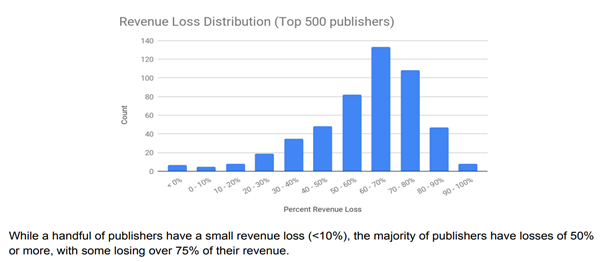Google must be prevented from carrying out further damage to news publishing. Movement for an Open Web or MOW today called for the UK competition regulator to impose a formal Restraining Order on the US tech giant.
The campaigning organisation has responded to a Competition and Markets Authority consultation with a plea for Google to be forced to stop restricting the ability of online publishers and other enterprises to go about their business. The call for an injunction comes as the CMA’s investigation of Google’s market dominance enters a second year.
MOW is concerned that Google intends to require businesses to use its proposed ‘Privacy Sandbox’ software. MOW highlights a 2019 document (below) authored by Google’s own engineers, which found that if Privacy Sandbox removes ‘third-party’ cookies used by businesses without an adequate replacement, most the world’s top 500 publishers would lose more than 50 per cent of their revenue, and some over 75 per cent.

This is tantamount to a major threat to journalism as news publishers increasingly rely upon digital advertising for income.
The CMA agrees with the finding and thinks the likely losses are closer to 70%. Google has tried to promote alternative products (FloC and Fledge) but in March 2021 it became clear that none would work.
In June, Google offered undertakings and announced it it would delay the introduction of Privacy Sandbox and the phasing out of third-party cookies. But it’s only a delay: Google is still intending to implement its changes. Although its undertakings are an improvement, it is going to be a serious challenge for the CMA to hold Google to them, or refine them further, without the legal force of an interim order.
James Rosewell, founder of MOW said it was vital the CMA took decisive action. “Having put the issue out for consultation, the authority must listen to those in Google’s imminent firing line. Google’s planned changes will hurt businesses – Google themselves say so. The CMA need to lean in and use their powers. If not, we will see many publishers, and with that their titles and their journalism, going to the wall or the ‘walled gardens’ of Google and Apple. Using an interim order will provide the time to negotiate workable improvements to competition and online privacy.”
Notes for editors
The above graph is about Google’s blocking of third-party cookies – one aspect of its ‘Privacy Sandbox’ browser changes.
Only there isn’t necessarily any privacy issue at all and Google knows it. While Google claimed “Privacy” to the CMA it was arguing the opposite to the UK Supreme Court. Google itself successfully argued before Supreme Court in Lloyd v Google that third-party cookies do not in themselves necessarily involve an invasion of personal privacy.
The Supreme Court decided against privacy class action campaigners because the third-party cookie was not shown to necessarily invade privacy. This position accords with the views of the CMA and UK Information Commissioner’s Office.
Yet Google continues to promote the abandonment of third-party cookies – while also promoting first-party cookies as being a viable privacy supporting alternative. In fact, they are no better at guarding privacy.
MOW believes that the time has come to call for the CMA to use its powers to issue an injunction. That should require Google to stop making its discriminatory and misleading statements to the market and to retract those that have taken place. Proper privacy protections need to be put in place and competition can then take place “on the merits”.
The injunction should be issued now to make the modified commitments stick, so Google is unable to implement any stage of Privacy Sandbox until it convinces the CMA it meets the commitments. Under the present arrangement, Google has agreed to consult with the CMA but can then implement changes. If the CMA finds they don’t meet the commitments it has to take action to unravel them after the event.
For more information:
Chris Blackhurst
chris@movementforanopenweb.com